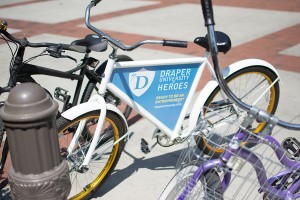Former students expand eco-friendly bike startup
The FreeBike Project, a startup launched by former USC students that provides eco-friendly transportation, is expanding its reach to about 800 bikes nationwide by the semester’s end.

Ads on wheels · Students pay a yearly deposit for free bicycles. The company is funded by advertisement revenue from the bicycle itself. – Mariya Dondonyan | Daily Trojan
The service allows students to pay a deposit to lease a bike for the school year. Since its founding in 2011, FreeBike Project has expanded to more than 20 campuses.
The founders, Johan Bender, 24, and Kim Sanderhoff, 35, came up with the idea when they were study abroad students at USC. The Danish duo met during their Introduction to Entrepreneurship course at the Marshall School of Business during fall 2011. They decided to stay for a full academic year after the FreeBike Project took off.
“It was just completely arbitrary that we ended up in the same class –— and then because we were both from Denmark, we ended up working together for the final project and that’s when we started the FreeBike Project,” Sanderhoff said.
The company has recently launched a project with the Bikes for the World organization to donate a bike every week. The project is a social media effort that involves the FreeBike Project riders submitting a photograph of themselves and their FreeBike Project bicycle. Riders post their photographs on a social media outlet with the hashtag #bikesfortheworld and the company pledges to donate a bicycle per week in the name of the user with the best photo for the week.
Sanderhoff, the company’s chief operations officer, was a model, actor and member of the Royal Danish Army before starting his undergraduate studies at the Copenhagen Business School. He was born in South Korea and grew up in a small town in Denmark. After serving for the Royal Danish Army, he spent nine years living in South Korea.
Sanderhoff’s interest in entrepreneurship developed during his years as a student in Denmark, where he studied business and psychology. He took this interest to the United States when he arrived at USC during the summer of 2011.
“I felt at home at USC, people are so ambitious,” he said.
His partner, Johan Bender, received his undergraduate degree in business and finance from the Copenhagen Business School. Bender focuses on the marketing and sales division of the company while Sanderhoff handles the day-to-day global operations. Bender is currently in the Danish offices of FreeBike Project and could not be reached for a comment.
“In five years I see the FreeBike Project active all around the country, and if that ends up happening, in 10 [years] I hope to see it all around the world,” Sanderhoff said.
Students participating in the project are also excited about where the company is heading.
Kathryn Rosenfeld, a junior majoring in chemical engineering, has used the FreeBike Project since the beginning of her sophomore year.
“I remember seeing them advertise bikes all over when I was a freshman,” Rosenfeld said. “One time I went up to someone and asked them how they got them, and they just told me to google FreeBike Project USC so I did, and I found their website.”
She said that the advertising on the bicycles also calls attention to the bicycles themselves.
“People come up to me actually pretty often and ask me about it, and I actually tell them the exact same thing,” she said.
Students were impressed by the company’s mission.
“It seems like a very interesting opportunity for a new company to be heading in the direction of both international philanthropy as well as positive eco-friendly contributions to the planet,” said Juan Ramirez, a junior majoring in global health.
Ramirez said a plan involving giving free bikes to students and also providing the rest of the world with free bikes is a novel idea.
“Where is the profit? – Its gives me hope in the current system, when business people have ‘giving as a goal,” Ramirez said.

